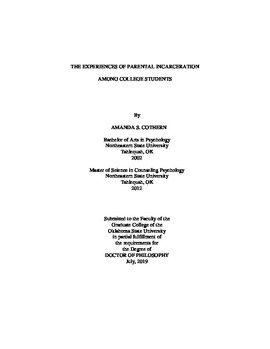| dc.contributor.advisor | Bishop, Alex | |
| dc.contributor.author | Cothern, Amanda S. | |
| dc.date.accessioned | 2020-01-30T15:03:03Z | |
| dc.date.available | 2020-01-30T15:03:03Z | |
| dc.date.issued | 2019-07 | |
| dc.identifier.uri | https://hdl.handle.net/11244/323340 | |
| dc.description.abstract | Incarceration is one of the single most important issues in Oklahoma. Incarceration rates of both men and women have exceeded all other states (Carson, 2017). Although research has explored the effects of parental incarceration among children, little effort has been dedicated toward understanding the impact of parental incarceration on the emerging adult child (Luther, 2015; Nesmith & Ruhland, 2008). The developmental stage of emerging adulthood includes the ages from 18-25 and is one of identity development and increased adult responsibility (Arnett, 2000). Therefore, this study aimed to explore the experiences of emerging adults attending college with a parent(s) currently or previously incarcerated. | |
| dc.description.abstract | Parental incarceration leads to the loss of a parent, temporarily or indefinitely, thus ambiguous loss theory served as a primary theoretical framework for this study (Boss, 2006). Ambiguous loss theory posits that a loss without closure is a complicated and ongoing grief process (Boss, 2006). Thus, the experiences of emerging adults, who normatively encounter increased responsibilities, commitments, and social experiences while attending college and adjusting to the ambiguous loss of an incarcerated parent are worthy of examination. | |
| dc.description.abstract | Using a qualitative case study research design, seven college students with a parent currently, or previously, incarcerated were interviewed. Focus groups and individual interviews were used and all sessions were audio recorded. Data was then transcribed verbatim and member checked for accuracy. Results included unique evidence of ambiguous loss across all seven cases along with high indications of self-efficacy. Conclusions from the findings highlighted five primary themes and four sub-themes. Primary themes included: childhood adversity, post-traumatic stress, ambiguous loss, social connectedness, and personal motivation. Furthermore, four underlying sub-themes were identified: adaptive capacity, economic emancipation, parentification, and savoring. Findings are further discussed in the framework of a newly proposed model of self-efficacy. Overall, the results have implications relative to informing educational administrators, instructors, and school or clinical counselors how best to build and sustain self-efficacy among emerging adults who may be seeking a college degree, while attending to a past or current relationship with an incarcerated parent. | |
| dc.format | application/pdf | |
| dc.language | en_US | |
| dc.rights | Copyright is held by the author who has granted the Oklahoma State University Library the non-exclusive right to share this material in its institutional repository. Contact Digital Library Services at lib-dls@okstate.edu or 405-744-9161 for the permission policy on the use, reproduction or distribution of this material. | |
| dc.title | Experiences of Parental Incarceration Among College Students | |
| dc.contributor.committeeMember | Johnson, Christine | |
| dc.contributor.committeeMember | Bindewald, Ben | |
| dc.contributor.committeeMember | Gardner, Brandt | |
| osu.filename | Cothern_okstate_0664D_16321.pdf | |
| osu.accesstype | Open Access | |
| dc.type.genre | Dissertation | |
| dc.type.material | Text | |
| dc.subject.keywords | ambiguous loss | |
| dc.subject.keywords | incarceration | |
| dc.subject.keywords | self-efficacy | |
| thesis.degree.discipline | Human Sciences | |
| thesis.degree.grantor | Oklahoma State University | |
